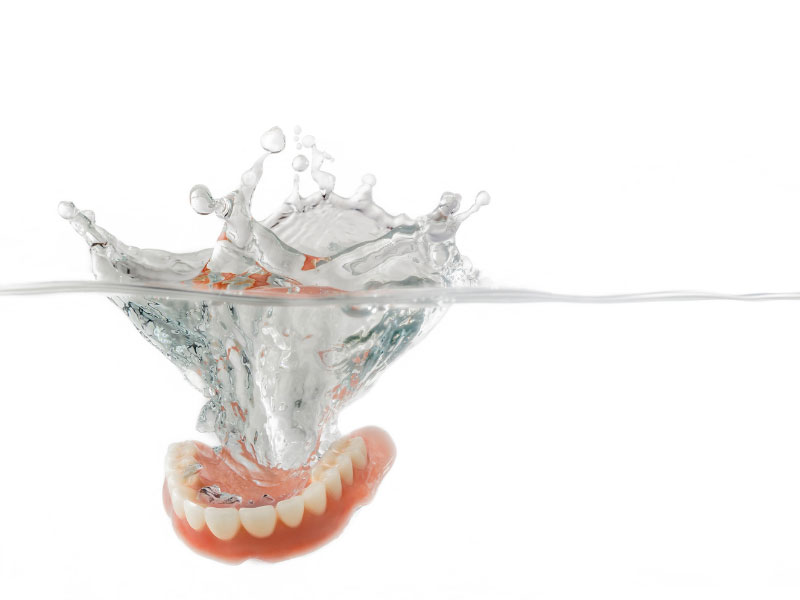Things You Should Know if You Have Dentures

Removable dental appliances, known as dentures or false teeth, are utilized to replace missing teeth and surrounding tissues. They serve as a practical solution for people who have lost some or all of their natural teeth for various reasons, such as decay, gum disease, or accidents. Dentures restore aesthetics, functionality, and confidence, enabling individuals to smile, eat, and speak easily. This blog post discusses everything you should know about dentures.
Types of Dentures
There are several types of dentures available, each tailored to specific dental needs:
Full Dentures: This type of dental appliance is utilized in cases where no natural teeth are present in either the upper or the lower jaw. Complete dentures rest on the gums and are supported by the underlying jawbone, providing a complete set of teeth for improved aesthetics and functionality.
Partial Dentures: Partial dentures are utilized when some natural teeth remain. They consist of artificial teeth attached to a metal or plastic framework, which clasps onto existing teeth for stability and support.
Implant-Supported Dentures: These dentures are anchored to dental implants surgically placed in the jawbone. Implant-supported dentures offer enhanced stability and prevent bone loss, resulting in a more secure and comfortable fit.
Getting Dentures
The process of getting dentures involves several essential steps to ensure a proper fit and comfortable experience:
Initial Consultation: The first step is to consult with a dentist or prosthodontist, who will evaluate the individual's oral health and determine the best denture option based on their needs.
Impressions: During the next appointment, impressions of the patient's mouth are taken to create accurate molds. These impressions are a blueprint for crafting custom dentures that fit snugly and comfortably.
Fittings: After the dentures are fabricated in a dental laboratory, the patient undergoes a fitting to ensure the prosthetics align correctly with the mouth's shape and bite. Necessary adjustments are made to achieve optimal comfort and functionality.
Final Placement: Once the dentures fit perfectly, they are ready for final placement. The dentist provides instructions on caring for and wearing dentures properly.
Adjusting to Dentures
Wearing dentures is a significant transition that requires patience and perseverance. As you embark on this journey, here are some essential tips to help you adjust to wearing dentures.
- Practicing Speaking: Speaking with dentures might feel challenging initially. To overcome this, practice speaking slowly and enunciate your words. Read aloud or converse with friends and family to build confidence and improve clarity.
- Eating Soft Foods: During the initial adjustment period, stick to soft foods that are easier to chew and swallow. Soups, mashed potatoes, yogurt, and steamed vegetables are great options. Gradually reintroduce harder foods into your diet as you become more comfortable with your dentures.
- Maintaining Good Oral Hygiene: Proper oral hygiene is crucial for denture wearers. After your meals, it's essential to remove your dentures and give them a rinse. A soft-bristled toothbrush is recommended for cleaning your gums, tongue, and palate. Before bedtime, clean your dentures thoroughly and soak them overnight in a denture-cleaning solution.
Common Challenges with Wearing Dentures
While dentures offer functional and aesthetic benefits, some challenges may arise during your denture-wearing experience. Here's how to address and overcome them:
- Sore Spots: It's normal to experience sore spots on your gums during the initial days of wearing dentures. To alleviate discomfort, apply a denture adhesive recommended by your dentist. If the soreness persists, consult your dentist for adjustments.
- Slipping Dentures: Dentures may shift or slip, especially while eating or speaking. Avoid this by using a denture adhesive to secure them in place. Additionally, practice proper tongue and facial muscle control to keep dentures steady.
- Difficulties with Certain Foods: Certain foods may pose challenges while wearing dentures, like sticky or hard items. Cut food into small, manageable pieces and chew slowly. Avoid biting with your front teeth; instead, use both sides of your mouth to distribute pressure evenly.
Denture Care and Maintenance
To ensure the longevity and effectiveness of your dentures, follow these essential care and maintenance tips:
- Daily Cleaning: Clean your dentures thoroughly after meals using a soft brush and mild denture cleaner. Avoid using regular toothpaste, which can be abrasive and damage the denture material.
- Soak Overnight: Remove your dentures before bedtime and soak them in water or a denture cleaning solution. Maintaining their shape and preventing drying out is achieved through this process.
- Handle with Care: When cleaning or handling your dentures, do so over a soft towel or water basin. This reduces the risk of breakage if they accidentally slip from your hands.
Regular Dental Checkups
Regular dental checkups are essential to ensure your dentures fit correctly and to monitor your oral health. Here's why they are crucial:
- Oral Health Assessment: Dentists will examine your mouth and gums to ensure there are no underlying issues or changes that could affect the fit of your dentures.
- Denture Adjustments: Over time, your gums and jawbone may change shape, affecting the fit of your dentures. Regular checkups allow your dentist to make necessary adjustments for a comfortable fit.
- Oral Cancer Screening: Dental checkups include oral cancer screenings, which are vital for early detection and treatment if abnormalities are found.
Dealing with Denture Odor
Denture odor can be an embarrassing issue, but with proper care, you can keep your dentures fresh and your breath pleasant. Here are some practical ways to combat denture odor:
Daily Cleaning Routine: Clean your dentures daily with a soft-bristled brush and mild denture cleaner. Avoid using regular toothpaste, which can be abrasive and damage the denture surface.
Soak Dentures Overnight: Remove your dentures at night and soak them in a denture-cleansing solution to remove stains and bacteria.
Brush Your Tongue and Gums: To minimize bacteria in your mouth, gently brush your tongue, gums, and palate with a soft toothbrush each morning and night.
Handling Denture Repairs
Accidents can happen, and if your dentures are damaged or require repairs, it's essential to handle the situation appropriately. Here is what you should do:
Avoid DIY Repairs: Refrain from attempting to fix your dentures at home using adhesives or glue, as this may lead to further damage and an ill-fitting denture.
Contact Your Dentist: If your dentures break, become loose, or need adjustments, contact your dentist immediately. They have the expertise to assess the situation and provide the necessary repairs.
Temporary Solutions: In the meantime, if you cannot visit your dentist immediately, you can use a denture adhesive as a temporary solution to keep your dentures in place until they are professionally repaired.
Have a Backup Set of Dentures: Having a backup set of dentures can be helpful in case of emergencies, ensuring you always have a functioning set.
By following these lifestyle and dental care tips, you can maintain the longevity and functionality of your dentures, ensuring a comfortable and confident smile. Remember to prioritize oral hygiene and seek professional assistance when needed.
Having dentures may require some adjustments, but with the right lifestyle choices and proper care, you can make the most of this dental solution. Embrace a balanced diet, avoid harmful habits, and stay hydrated to support your oral health and overall well-being. Combat denture odor through regular cleaning and dental checkups, ensuring a fresh and confident smile. Remember to seek professional assistance for denture repairs and avoid DIY fixes to prevent further complications.
Considering these considerations, you can confidently navigate life with dentures, enjoying their benefits and embracing your newfound comfort and self-assurance. By following these tips, you can maintain a radiant smile and continue living life to the fullest. Contact us at Fine Dentistry of Downtown Orlando for more information!





Please login to publish a comment.
Comments (0)